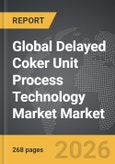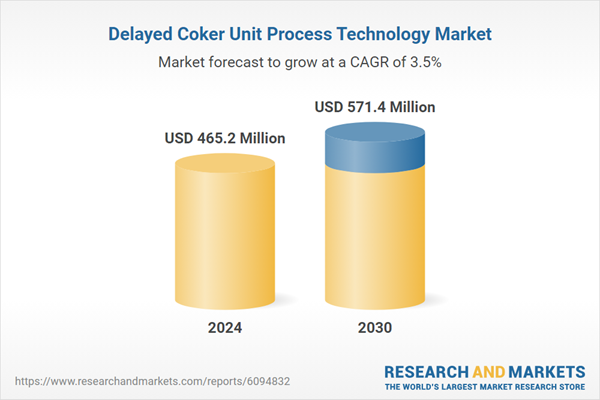Global Delayed Coker Unit Process Technology Market - Key Trends & Drivers Summarized
What Is Driving the Rising Adoption of Delayed Coker Unit (DCU) Technology in Refining?
Delayed Coker Unit (DCU) process technology has emerged as a critical refining solution for maximizing the yield from heavy crude oils and refinery residues. As global refiners face a growing supply of heavier, sour crudes and tightening margins on traditional fuels, the delayed coking process provides a viable route to convert residual feedstocks like vacuum residue and asphalt into lighter, higher-value products such as naphtha, diesel, gas oils, and petroleum coke. This makes DCUs an essential part of modern upgrading strategies in complex refineries, especially in regions where light sweet crude supplies are declining.The increased demand for transportation fuels in developing economies, coupled with regulatory pressure to reduce fuel oil usage in marine and power sectors, is reinforcing the need for bottom-of-the-barrel conversion technologies. DCU systems allow refiners to reduce waste, improve profitability, and comply with environmental mandates by minimizing residual fuel production. As refineries worldwide invest in modernization and complexity enhancement, delayed coking has become a cornerstone of refinery integration, especially in high-capacity, export-oriented refining hubs.
How Are Advancements in Reactor Design and Coke Handling Transforming Operations?
Technological advancements in DCU reactor configuration, drum design, and coke-cutting systems are significantly improving throughput, safety, and operational reliability. Modern units are equipped with dual-drum switching systems that allow for continuous operation, enhanced thermal cracking efficiency, and better cycle management. Innovations in coke drum metallurgy and quench system design have led to lower stress and thermal fatigue, increasing drum longevity and reducing maintenance downtime. The integration of advanced sensors and drum health monitoring systems further contributes to real-time performance management and predictive maintenance.Coke handling has also seen notable improvements. Automated unheading systems, high-pressure water jet decoking, and enclosed coke transport mechanisms are being adopted to minimize operator exposure and reduce emissions. Moreover, refiners are incorporating modular and compact DCU designs that allow easier brownfield integration and faster deployment, particularly in constrained refinery layouts. These enhancements not only improve safety and environmental performance but also contribute to the economic feasibility of coking projects in small and mid-sized refineries.
What Role Do Regulatory Pressures and Fuel Specifications Play in Shaping Market Demand?
Evolving fuel quality regulations, particularly regarding sulfur content and carbon emissions, are prompting refiners to seek more flexible, residue-upgrading technologies. Delayed coking enables refineries to comply with low-sulfur fuel standards by diverting high-sulfur residue away from fuel streams and converting it into petroleum coke, which can be exported or used in industrial heating applications. In the marine fuels sector, IMO 2020 regulations banning high-sulfur bunker fuels have accelerated demand for DCU-based resid conversion as refiners attempt to eliminate heavy fuel oil from their output.Additionally, the tightening of emissions norms for transportation fuels across North America, Europe, and Asia has catalyzed investment in residue upgrading units, with delayed coking forming a core component. In several integrated refinery-petrochemical complexes, DCUs are being used in tandem with hydrocrackers and visbreakers to tailor feedstock quality for downstream petrochemical production. National oil companies and independent refiners alike are strategically deploying DCUs to remain competitive amid fluctuating crude qualities, stringent carbon policies, and shifting product demand patterns.
What Are the Major Forces Driving Market Expansion for Delayed Coking Technology?
The growth in the delayed coker unit process technology market is driven by several factors, including the increasing global dependence on heavy and sour crude processing, rising investment in refinery residue upgrading, and the need to comply with evolving fuel quality mandates. The growing focus on enhancing refining complexity to improve product yields from bottom-of-the-barrel feedstocks is leading to widespread installation of DCUs, especially in Asia-Pacific, the Middle East, and Latin America. These regions are witnessing aggressive refinery expansions, both to meet domestic demand and to position themselves as export hubs.Technological upgrades such as high-capacity coke drums, integrated decoking automation, and energy-efficient heater systems are attracting refiners looking to reduce carbon intensity and operating costs. The rising industrial demand for anode-grade and fuel-grade petroleum coke in the aluminum, cement, and steel industries is also indirectly bolstering the case for DCU implementation. Moreover, the need for refinery flexibility in handling a broader slate of crude oils - including opportunity crudes and tar sands - makes delayed coking an indispensable technology in future-proofing refining operations. As global refining strategies align with decarbonization, efficiency, and profitability, DCU technologies are set to play a pivotal role in next-generation refinery infrastructure.
Report Scope
The report analyzes the Delayed Coker Unit Process Technology market, presented in terms of market value (US$). The analysis covers the key segments and geographic regions outlined below:- Segments: Type (Single-fired Delayed Coker Unit, Dual-fired Delayed Coker Unit); Application (Petroleum Refining Application, Steel & Cast Iron Application, Other Applications).
- Geographic Regions/Countries: World; United States; Canada; Japan; China; Europe (France; Germany; Italy; United Kingdom; Spain; Russia; and Rest of Europe); Asia-Pacific (Australia; India; South Korea; and Rest of Asia-Pacific); Latin America (Argentina; Brazil; Mexico; and Rest of Latin America); Middle East (Iran; Israel; Saudi Arabia; United Arab Emirates; and Rest of Middle East); and Africa.
Key Insights:
- Market Growth: Understand the significant growth trajectory of the Single-fired Delayed Coker Unit segment, which is expected to reach US$410.4 Million by 2030 with a CAGR of a 4.1%. The Dual-fired Delayed Coker Unit segment is also set to grow at 2% CAGR over the analysis period.
- Regional Analysis: Gain insights into the U.S. market, valued at $126.7 Million in 2024, and China, forecasted to grow at an impressive 6.6% CAGR to reach $114.8 Million by 2030. Discover growth trends in other key regions, including Japan, Canada, Germany, and the Asia-Pacific.
Why You Should Buy This Report:
- Detailed Market Analysis: Access a thorough analysis of the Global Delayed Coker Unit Process Technology Market, covering all major geographic regions and market segments.
- Competitive Insights: Get an overview of the competitive landscape, including the market presence of major players across different geographies.
- Future Trends and Drivers: Understand the key trends and drivers shaping the future of the Global Delayed Coker Unit Process Technology Market.
- Actionable Insights: Benefit from actionable insights that can help you identify new revenue opportunities and make strategic business decisions.
Key Questions Answered:
- How is the Global Delayed Coker Unit Process Technology Market expected to evolve by 2030?
- What are the main drivers and restraints affecting the market?
- Which market segments will grow the most over the forecast period?
- How will market shares for different regions and segments change by 2030?
- Who are the leading players in the market, and what are their prospects?
Report Features:
- Comprehensive Market Data: Independent analysis of annual sales and market forecasts in US$ Million from 2024 to 2030.
- In-Depth Regional Analysis: Detailed insights into key markets, including the U.S., China, Japan, Canada, Europe, Asia-Pacific, Latin America, Middle East, and Africa.
- Company Profiles: Coverage of players such as Baobab Foods LLC, Basic American Foods, BC Foods, Inc., Catz International B.V., European Freeze Dry Ltd. and more.
- Complimentary Updates: Receive free report updates for one year to keep you informed of the latest market developments.
Some of the 34 companies featured in this Delayed Coker Unit Process Technology market report include:
- AstraConcepts
- Axens
- Bechtel Corporation
- CB&I (Chicago Bridge & Iron)
- Chevron Lummus Global (CLG)
- China National Petroleum Corporation (CNPC)
- Fluor Corporation
- Foster Wheeler AG
- Honeywell UOP
- Hyundai Engineering
- ISGEC Heavy Engineering Ltd.
- Jacobs Engineering Group Inc.
- KBR, Inc.
- Linde Engineering
- Lummus Technology
- McDermott International, Inc.
- MOGAS Industries
- Sulzer Ltd.
- SUPCON Group
- Wood Plc
This edition integrates the latest global trade and economic shifts into comprehensive market analysis. Key updates include:
- Tariff and Trade Impact: Insights into global tariff negotiations across 180+ countries, with analysis of supply chain turbulence, sourcing disruptions, and geographic realignment. Special focus on 2025 as a pivotal year for trade tensions, including updated perspectives on the Trump-era tariffs.
- Adjusted Forecasts and Analytics: Revised global and regional market forecasts through 2030, incorporating tariff effects, economic uncertainty, and structural changes in globalization. Includes historical analysis from 2015 to 2023.
- Strategic Market Dynamics: Evaluation of revised market prospects, regional outlooks, and key economic indicators such as population and urbanization trends.
- Innovation & Technology Trends: Latest developments in product and process innovation, emerging technologies, and key industry drivers shaping the competitive landscape.
- Competitive Intelligence: Updated global market share estimates for 2025, competitive positioning of major players (Strong/Active/Niche/Trivial), and refined focus on leading global brands and core players.
- Expert Insight & Commentary: Strategic analysis from economists, trade experts, and domain specialists to contextualize market shifts and identify emerging opportunities.
Table of Contents
Companies Mentioned (Partial List)
A selection of companies mentioned in this report includes, but is not limited to:
- AstraConcepts
- Axens
- Bechtel Corporation
- CB&I (Chicago Bridge & Iron)
- Chevron Lummus Global (CLG)
- China National Petroleum Corporation (CNPC)
- Fluor Corporation
- Foster Wheeler AG
- Honeywell UOP
- Hyundai Engineering
- ISGEC Heavy Engineering Ltd.
- Jacobs Engineering Group Inc.
- KBR, Inc.
- Linde Engineering
- Lummus Technology
- McDermott International, Inc.
- MOGAS Industries
- Sulzer Ltd.
- SUPCON Group
- Wood Plc
Table Information
| Report Attribute | Details |
|---|---|
| No. of Pages | 268 |
| Published | January 2026 |
| Forecast Period | 2024 - 2030 |
| Estimated Market Value ( USD | $ 465.2 Million |
| Forecasted Market Value ( USD | $ 571.4 Million |
| Compound Annual Growth Rate | 3.5% |
| Regions Covered | Global |









